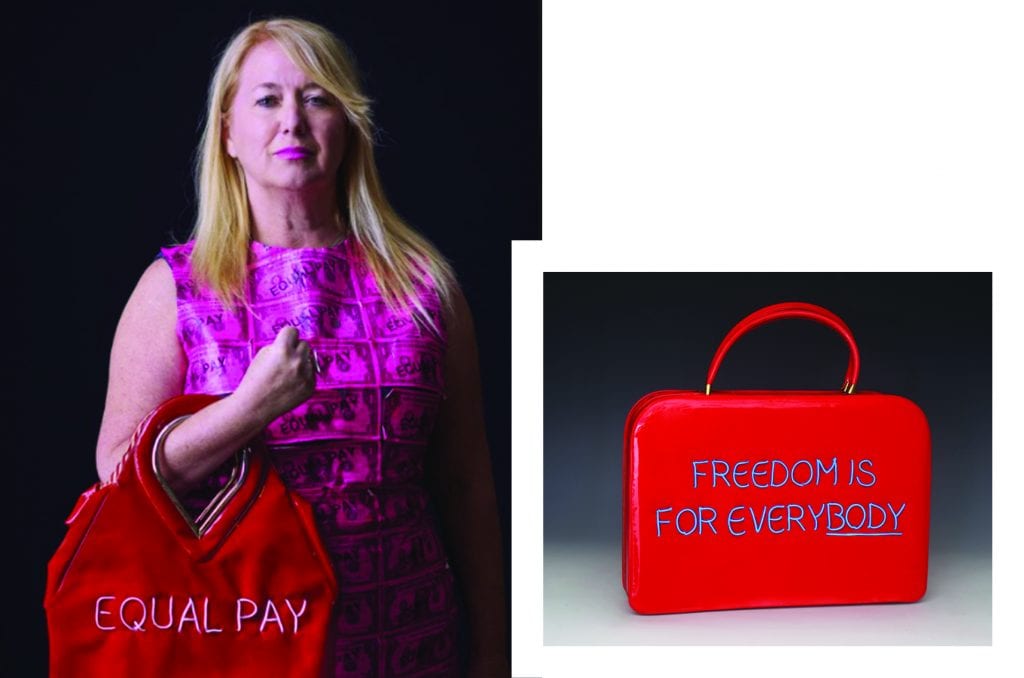Michele Pred believes in using art as a platform for exploring the big issues. The Swedish-American artist utilizes everyday items to tackle subjects like pay inequality and personal security. She’s bringing her evocative work to St. Louis in the exhibition Freedom is for Everybody. “I want people to think about what freedom means, how everyone deserves it and what you can do to ensure that more people experience equity,” she explains. The exhibit will be held at Barrett Barrera Projects’ projects+gallery space from May 20 to Aug. 7.
Where did your interest in art arise?
I grew up in California in a very political family. My father was a professor at U.C. Berkeley for more than 40 years. I’m also half Swedish, so we spent a lot of time in Sweden where I become aware of how other countries handle equality and access to things like health care. I felt that art was the best way to get people to discuss and think about social justice issues.
Why do you think art is an important platform for social issues?
People are stimulated by artwork. It allows them to see these issues in a different way, instead of just how they are presented in the news or online. My intention is to provoke and ignite conversation and new thoughts. That’s really essential. I don’t want to create something that tells anyone what to think. I want to inspire people to think differently, to consider both sides of the coin. My goal really is to help you look at things in a different light.
Have you always used everyday items in your work?
I started with photography, but I felt like everyday items were charged with a lot of meaning, so I wanted to unpack those layers. After 9/11, I worked with objects confiscated at airports because they were symbolic of what was happening in society, and still is 20 years later. All of a sudden, these mundane household items like tweezers were considered weapons. Some of these items, such as pocket knives, also held great sentimental value for people. I heard lots of stories about people who lost something that had been given to them by a family member.
Tell me about some of the pieces in the exhibit.
One is a cross created out of confiscated knives. When I made it, I felt like it reflected the crisis of the time, coupling the loss of lives with the loss of a sense of freedom after 9/11. Now, I think it speaks to where we are with COVID-19 and other social unrest. The exhibit also features works from a series of vintage purses with neon text that I started in 2014. Originally, the focus was on reproductive rights, and I chose vintage handbags because they call back to a time when women had less autonomy and those rights were restricted. However, there are so many feminist issues that need to be discussed, such as equal pay or the Time’s Up movement. The purses are like small-scale billboards and always start a conversation. They’re battery-operated, so you can carry them. For this show, 5% of purse sales will be donated to Planned Parenthood of the St. Louis Region and Southwest Missouri.
How has the pandemic impacted your work?
I haven’t spent much time in the studio. I have an 11-year-old daughter who has been remote learning, and I haven’t wanted to leave her. Many shows also have been cancelled or postponed, so I have been working on initiatives like The Art of Equal Pay, which is a project I launched to decrease the gender and racial pay gap for visual artists. There is not a lot of data on pay inequity in art culture, so I created a survey to collect information from artists at theartofequalpay.com. It’s been a big project, and we’re still in the early stages. People also can visit the website and leave a digital signature to show support.
